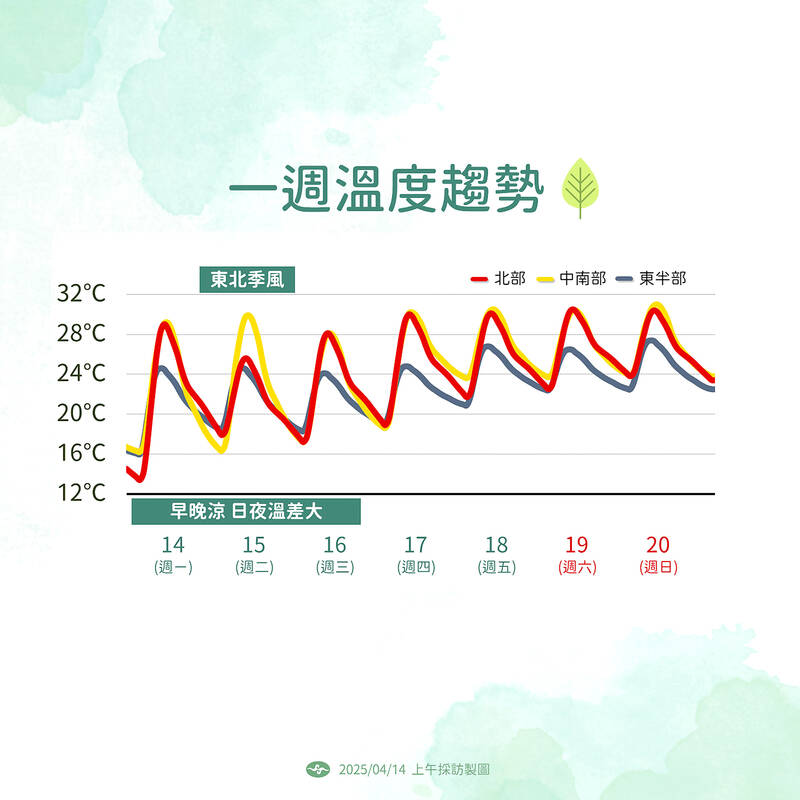The risk of stroke is doubled when a sudden day-to-day temperature increase goes over 6°C or a decrease exceeds 14°C, the risk of triggering a stroke is doubled, a research team at the National Health Research Institute (NHRI) said yesterday.
Extreme weather events are becoming more frequent and intense around the world, and the World Meteorological Organization said that last year was the warmest year on record, the research team said.
A 2012 Global Burden of Disease study showed that stroke was the second most common cause of death worldwide and that ambient temperature was a risk factor for stroke, they said.

Photo provided by the Central Weather Administration
NHRI Institute of Environmental Health Sciences assistant researcher Wu Wei-te (吳威德) said that climate could affect cardiovascular health, but the impact of temperature fluctuations on stroke risk remained underexplored, so the team aimed to find links between sudden day-to-day temperature changes and stroke onset in Taiwan, with air pollutants also taken into consideration.
The team said it used temperature records and data on about 1.1 million first-time stroke emergency events between 2001 and 2020 to examine the connection between temperature changes and stroke risk, including total stroke, ischemic stroke and hemorrhagic stroke.
Wu said they found that when the rise in day-to-day temperature exceeded 6°C, the risk of ischemic stroke more than doubled, and a day-to-day fall exceeding 14°C doubled the risk of hemorrhagic stroke.
Moreover, a temperature exceeding 35°C was associated with an increased likelihood for stroke-related emergency department visits, primarily ischemic stroke, while temperatures below 16°C was strongly associated with a doubled risk of hemorrhagic stroke, he said.
The link between hot weather and ischemic stroke is likely because high temperatures could lead to dehydration, and subsequently to thicker blood and increased risk of blood clots, which can block arteries, Wu said.
Meanwhile, low ambient temperatures can activate the sympathetic nervous system, leading to the narrowing of blood vessels and increased blood pressure, he added.
Wu said the team’s findings indicate that sudden day-to-day temperature increases and decreases can be significant predictors of stroke onset.
If the weather and health risk warning mechanisms could be integrated into public health policy, especially during seasonal changes or extreme weather events, it might help elderly people or people who have a high risk of stoke to take preventive measures, he said, adding that it could reduce the impact of sudden temperature changes on people’s health.
The study is to be published in the international journal The Lancet Regional Health — Western Pacific this month.

South Korean K-pop girl group Blackpink are to make Kaohsiung the first stop on their Asia tour when they perform at Kaohsiung National Stadium on Oct. 18 and 19, the event organizer said yesterday. The upcoming performances will also make Blackpink the first girl group ever to perform twice at the stadium. It will be the group’s third visit to Taiwan to stage a concert. The last time Blackpink held a concert in the city was in March 2023. Their first concert in Taiwan was on March 3, 2019, at NTSU Arena (Linkou Arena). The group’s 2022-2023 “Born Pink” tour set a

The Taiwan High Court yesterday upheld a lower court’s decision that ruled in favor of former president Tsai Ing-wen (蔡英文) regarding the legitimacy of her doctoral degree. The issue surrounding Tsai’s academic credentials was raised by former political talk show host Dennis Peng (彭文正) in a Facebook post in June 2019, when Tsai was seeking re-election. Peng has repeatedly accused Tsai of never completing her doctoral dissertation to get a doctoral degree in law from the London School of Economics and Political Science (LSE) in 1984. He subsequently filed a declaratory action charging that

The Hualien Branch of the High Court today sentenced the main suspect in the 2021 fatal derailment of the Taroko Express to 12 years and six months in jail in the second trial of the suspect for his role in Taiwan’s deadliest train crash. Lee Yi-hsiang (李義祥), the driver of a crane truck that fell onto the tracks and which the the Taiwan Railways Administration's (TRA) train crashed into in an accident that killed 49 people and injured 200, was sentenced to seven years and 10 months in the first trial by the Hualien District Court in 2022. Hoa Van Hao, a

The Sports Administration yesterday demanded an apology from the national table tennis association for barring 17-year-old Yeh Yi-tian (葉伊恬) from competing in the upcoming World Table Tennis (WTT) United States Smash tournament in Las Vegas this July. The sports agency said in a statement that the Chinese Taipei Table Tennis Association (CTTTA) must explain to the public why it withdrew Yeh from the WTT tournament in Las Vegas. The sports agency said it contacted the association to express its disapproval of the decision-making process after receiving a complaint from Yeh’s coach, Chuang